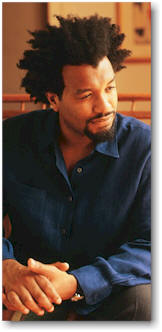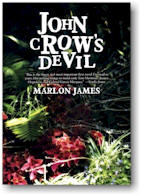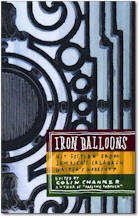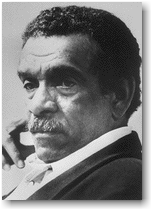Colin Channer on Caribbean Literature, the Black Readers, Love, Urban Fiction, and the Art of Writing
 With the stunning 1998 publication of Waiting In Vain,
Colin Channer introduced the sensuality and spirituality of reggae as a
literary form on American shores, mixing imagination and improvisation into a
heady blend of poetic fireworks and political savvy in something unseen in
Yankee bookstores. That colorful hybrid debut was followed with his lyrical
sophomore offering, Satisfying My Soul (2002) and a powerful short
fiction collection, Passing Through (2004), which the publishing world
proclaimed Channer’s work as ’some of the finest writing produced by one of the
Caribbean Diaspora’s writers.’ He is also the founder of the popular annual
Calabash International Literary
Festival in Jamaica.
With the stunning 1998 publication of Waiting In Vain,
Colin Channer introduced the sensuality and spirituality of reggae as a
literary form on American shores, mixing imagination and improvisation into a
heady blend of poetic fireworks and political savvy in something unseen in
Yankee bookstores. That colorful hybrid debut was followed with his lyrical
sophomore offering, Satisfying My Soul (2002) and a powerful short
fiction collection, Passing Through (2004), which the publishing world
proclaimed Channer’s work as ’some of the finest writing produced by one of the
Caribbean Diaspora’s writers.’ He is also the founder of the popular annual
Calabash International Literary
Festival in Jamaica.
Currently, Channer has published another collection, Iron Balloons, an anthology of 11 short stories of authors groomed by the acclaimed Calabash Writer’s Workshops for many years. The collection, teachers and students alike, has something for everyone, concocting a fictional brew of tropical spice, magic realism, simmering eroticism, thematic diversity, and that intangible element ’ good old-fashioned Caribbean charisma. These wonderful, evocative stories stick with the reader long after he has turned the last page.
Ever the personable salesman, Channer is currently working his way through a very busy schedule of readings and media appearances touting his latest, charming fan and critic alike. An assistant professor of English and the coordinator of the B.A. creative writing program at Medgar Evers College in Brooklyn, New York. He took time out to speak with AALBC.com about the book, the Caribbean literature, the black reading public, love, urban fiction, and the art of writing.
Explain the title of Iron Balloons. What is the significance?
There’s the saying that an iron balloon can’t fly. In Jamaica, we say that an iron balloon can’t bus’. Which means you can’t pop it. So Jamaicans use the term ’iron balloon’ to refer to a singer who can’t seem to bus’ or pop (blow up) no matter what. There used to be, and still is, the idea that an emerging writer in Jamaica is by definition an iron balloon. The rationale is that the mechanisms of development are scarce, namely publishers, workshop opportunities and writing communities. I appropriated the name for the book to be ironic.
How did you choose the titles for the collection? By the various themes or the quality of the authors?
I worked like an old school reggae producer. I selected the best work, a combination of writing submitted by students and writing offered by tutors and arranged them in the sequence that I thought would have the best effect on a reader. The work of inclusion, of making sure that a diverse range of writers would be published in the book began at the stage of offering the scholarships to the workshops on 2003. We made sure to identify the various constituencies of emerging writers and we used what we thought was the best channels of communication to reach each one. If you begin with a diverse pool of talent you’re likely to get a lot of good writing that spans across a diverse range of themes, situations, settings, genres, styles and voices, which is what we have in this book.
Why the publisher, Akashic Books? What makes this publisher the perfect home for this collection?
Akashic is one of the best publishers in the country, but that is only if you judge a publisher by the quality of writing they support, the originality of their covers and the effort they put behind positioning their books and communicating the value of each title to the review community. Akashic and the Calabash International Literary Festival Trust, of which I’m founder and artistic director, share certain visions and values. For example, we’re both champions of quality fiction and all our choices are not driven by money.
You often talk about the spiritual and literary aspects of reggae and the profound effect it has on Caribbean literature. Is that mythical grip starting to loosen its influence on the writers and artists in the islands?
It is hard to say. Two things are happening at the same time. Generations are being born into worlds where they consume American popular culture the way most Americans do, via the Internet, movies and TV. So we have generations growing up with a taste for American pop culture, of which music is an important part. So Caribbean music has a competition for their time, their hearts and their minds. At the same time, you have a greater number of Caribbean ’ especially Jamaican ’ writers and artists who are consciously or unconsciously working out of a reggae esthetic. These writers are gaining a stronger connection with readers in their home countries these days, especially in Jamaica. In Jamaica, the only country about which I can speak in a specific way, a wonderful distributor, Novelty Trading Company, actively seeks out titles by authors from Jamaica and the Jamaica Diaspora ’ especially those in America, Canada and Britain ’ to distribute through their network of retail outlets. These outlets are not just bookstores. They are pharmacies, supermarkets, hotel gift shops and more.
Talk about the legacy of the Calabash International Literary festival.

John Crow’s Devil
by Marlon James
September 2005
Calabash has managed to gain a reputation for being one of the world’s best-managed and best-programmed literary festivals in only six short years. Through its workshops, it has launched careers ’ six books of poetry, one novel, one anthology. Marlon James came out of our workshops with a novel, John Crow’s Devil, that went on to be nominated for an LA Times Book Award and a regional Commonwealth Writer’s Prize. Ishion Hutchinson got a scholarship to enter NYU’s MFA writing program largely on the strength of his chapbook, Bryan’s Boy, which we published as part of our chapbook series. Calabash has proven a few things. One of them is that there are spaces in which great literature, including great literature produced by writers of color, is able to attract large, devoted audiences. It has also proven that there are spaces in which ordinary people, black people, will turn out in the thousands to listen to great writing and buy great books. It has also proven that world standards can be achieved in so-called third world countries or in economically marginalized communities if there is ambition, commitment, discipline, leadership and trust.
Why does the American reading audience shun foreign language writers and their literature? Especially the black American readership?
Black Americans are Americans, so they live within the basic geographic and linguistic limitations; but there’s something else going on, I think. Readers of literary fiction are overwhelmingly college educated. Black Americans are proportionally less college educated than the general population, for present and historical reasons. If you counter by saying that today we have more college educated black Americans than at any time at history, and yet we haven’t see a proportional increase in the amount of literary fiction (which includes books by foreign authors) being sought out and read by black Americans, then I would point out that reading, and reading literary fiction specifically, is not a habit acquired overnight. It is a habit acquired over generations.
One noted critic said that the black Americans and Third World writers suffer from a kind of ’inferior complex’ in term of the sweep, range and depth of their themes. Comment on this.
I think this is rubbish really. I think that generally speaking American writers are still contending with the self-consciousness of being the little brother of the European literary tradition, hence the notion of the great American novel, the important novel set in an American landscape filled with American people. There’s no equivalent in Europe. The Europeans consider this business of the great (fill in the nation) novel has already been done, and on more than one occasion. Black Americans are working out their American anxiety while at the same time working out their peculiar anxieties about their status as American citizens, so their work is understandably dominated by a domestic focus, by localized concerns. Of course, I’m talking about writers of ambition and achievement here, not purveyors of schlock.
But all great writing is specific, but specific in ways that make it universal. And this is the reason why we value the work of authors like Toni Cade Bambara, Rita Dove, Alice Walker, Gwendolyn Brooks, August Wilson, James Baldwin and Toni Morrison. Don’t we? Derek Walcott (St. Lucia), Wole Soyinka (Nigeria), Gabriel Garcia Marquez (Colombia), V.S. Naipaul (Trinidad & Tobago), Naguib Mahfouz (Egypt), Nadine Gordimer (South Africa), J.M. Coetzee (South Africa), Octavio Paz (Mexico), Rabindranth Tagore (India), Pablo Neruda (Chile), and Saint-John Perse (Guadeloupe), are all writers from Latin America, the Caribbean and south Asia ’ the third world. They’re also winners of the Nobel Prize in Literature ’ each and every one of them. What does your critic have to say about that?
You have said that many of the black writers are pandering to the lowest themes of sex, violence and vulgarity. I’m paraphrasing this. Talk about this.
Urban lit is really popular right now and many people are concerned, freaked out, if you will. Nick Chiles wrote an op-ed piece about in the New York Times earlier this year and that turned up the heat. Many people blame the publishers but I don’t. This is not a kind of writing that came from the top down. It came from the bottom up. Publishers caught on to an existing trend that had already reached a tipping point. It doesn’t surprise me that so many uneducated or undereducated people read these books. It surprises me that so many educated people read these books, that so many people read below what ought to be their natural reading level. If the black writer of quality fiction cannot depend on educated black people to sustain his or her career, then whom will he or she depend on?
VIBE Media Group and
Kensington Publishing announced the acquisition of the first title in
the VIBE Street Lit franchise, Death Around the Corner, by famed rapper
C-Murder. The inaugural title will be released in trade paperback on
December 26, 2006.
______
G-Unit Books, Hip hop star 50 Cent’s new book publishing line at
MTV/Pocket Books. Roy Glenn associate publisher of Urban Books
introduces Urban Soul to debut in Summer of 2006.
______
One World Launches Nikki Turner Book Line - Nikki Turner Presents
"…Nikki Turner Presents, a line of urban fiction titles written by new
and original authors
There’s something going on in our culture that we don’t want to face. It’s simply this ’ for an increasing number of Americans, black, white and other, a book is simply another form of entertainment content. It is no longer an object of special value, no longer a mean of travel, of discovering the self and the world of others. It’s simply an entertainment medium that is infinitely less convenient and audio-visually compelling than a movie, a television show, a video game or a song.
Before I finish I should make something clear. Themes of sex and violence are not low brow by definition. I really don’t have to say this but I’m going to say it just in case. If you want to read some great scenes of violence, read Hemingway’s For Whom The Bell Tolls. If you want gangsterism, nor war, read Legs by William Kennedy If you want to read some great sex scenes, read John Updike’s Couples or Sabbath’s Theater by Philip Roth. Are these bad books? No.
Why has love become a coarse, nasty word?
I didn’t know that love has become a coarse, nasty word. I know that people are suspicious about the word, love, because it’s become so overused that it’s lost its meaning. It has suffered the fate of all clich’s.
What do you think of your homeland? Do you idolize or romanticize it and its potential and prospects?
I know Jamaica too much to romanticize it. It’s a complicated place and I try to bring out its complications in my work. Jamaica is like Brazil, you know, a dynamic place that gets a lot of its creative energy from the power released when the tectonic plates that bear the haves and the have-nots continually sheer and collide. Jamaica is a country with a reputation way beyond its size or population. We have the uncanny ability to find our way to the center of things’politics, sports, academia, business, science, the arts’the crime too.
What do you do when you’re not writing?
I bullshit, raise kids, teach college, read novels, skim magazines, do yoga, lift weights, listen to jazz and classic reggae, run Calabash and marvel at the pile of papers on my desk.
What are you working on at present?
I’m not allowed to say.
Are you planning any other collections?
I have to see the work produced in the next Calabash workshop. If the work sucks, then no. If it’s really good as I expect it to be, you’ll get another one for sure.



